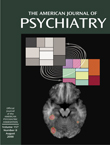Yohimbine Challenge in Children With Anxiety Disorders
Abstract
OBJECTIVE: The authors evaluated the neurohormonal and subjective mood response of children with anxiety disorders who were challenged with yohimbine. METHOD: Seventeen children with DSM-IV diagnoses of anxiety disorders and 15 normal comparison children were given yohimbine orally (0.1 mg/kg). Neurohormonal measures and visual analog self-reports of tenseness were recorded over a 150-minute period. RESULTS: Yohimbine was uniformly well tolerated, and it behaviorally differentiated children with anxiety disorders from normal comparison children with higher maximum change (Δmax) ratings of anxiety in the patients (mean=17.4 mm, SD=29.8) than in the comparison subjects (mean=0.3 mm, SD=4.4). Yohimbine-stimulated Δmax growth hormone (GH) for children with anxiety disorders (mean=–1.5 ng/ml, SD=5.9) was significantly reduced compared to that of normal comparison children (mean=2.7 ng/ml, SD=4.5). CONCLUSIONS: Yohimbine selectively elevates self-rated anxiety in children with anxiety disorders and is associated with the blunting of GH in those children relative to that of comparison children. Presence of a blunted GH response to yohimbine in children with anxiety disorders is reminiscent of findings in adults with anxiety disorders, particularly panic disorder. These findings support enhanced central adrenergic sensitivity in children with anxiety disorders, as demonstrated by yohimbine-exacerbated anxiety. The findings should be reconciled with the absence of clonidine-related GH blunting in the same cohort.



